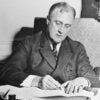Roger Scruton has died. Conservatism has lost one of its great thinkers.
Scruton, who died Jan. 12 at age 75, authored more than 50 books on an astonishing number of subjects. He wrote about conservative political philosophy and Western civilization with erudition and grace, and was a trenchant critic of leftist thought.
But Scruton also wrote about other aspects of philosophy, aesthetics, art, music, architecture, literature, conservation and environmentalism, religion, sexual desire, hunting, and wine. He also wrote novels and operas.
His books reflect deep learning, but they aren’t academic or ponderous. They explain. They are clear, compelling, and a joy to read. His work deepens our understanding of what it means to be human and how to promote human flourishing.
Among British conservatives, he was rightly regarded as a national treasure. He was knighted in 2016. British Prime Minister Boris Johnson tweeted, “RIP Sir Roger Scruton. We have lost the greatest modern conservative thinker – who not only had the guts to say what he thought but said it beautifully.”
Scruton influenced ideas and events not only in Britain, but around the world. At significant personal risk, he spoke to, taught, and assisted dissidents in communist Czechoslovakia, Poland, and Hungary during the Cold War. Many of those he helped became leaders in post-communist central Europe.
Those seeking an introduction to Anglo-American conservative thought could do no better than to read Scruton’s 2018 book “Conservatism: An Invitation to the Great Tradition.”
Those seeking to hear him discuss the importance of private property and markets (and a wide variety of other topics) could watch “An Interview with Roger Scruton,” recorded during his visit to The Heritage Foundation in October 2018.
In 2015, Heritage published his paper, “The Good of Corporations.” Later that year, he gave a lecture at The Heritage Foundation, “The Future of European Civilization: Lessons for America.” In 2003, he spoke at Heritage about “The United States, the United Nations, and the Future of the Nation-State.”
Sir Roger Scruton is gone, but we are fortunate to have his body of work to inform us, to challenge us, and to help us continue the work of conserving a free society.
































